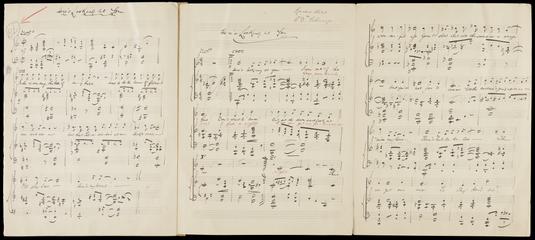
Ronald Sidney Hill 1911 - 1991
- occupation:
- Musician
- Nationality:
- British
- born in:
- Hampstead, Camden, London, Greater London, England, United Kingdom
Ronald ‘Ronnie’ Hill was considered a musically gifted child, writing a fox-trot performed for injured troops billeted at his family home Langford House, Bristol, during WWI. While at Cambridge he joined the Footlights and performed in his first radio show, a variety programme broadcast 1 October 1930 on 5WA Cardiff. After this, he quit his third year to become a singer-songwriter and musical director of revue shows.
He performed with several dance bands throughout the 1930s. Pre-1935 he was one of Bert Ambrose’s ‘Rhythm Brothers’ with Clive Erard and Jack Lorimer, learning close harmony singing in the famous dance orchestra. Post-1935, he was a regular singer with Billy Gerhardi and His Band, which was broadcast on BBC radio from the Piccadilly Hotel. In 1936 Hill was also hired as the singing partner for Billie Houston, one of the Houston Sisters who were top billed Music Hall and Variety stars.
Hill started to appear in BBC radio revues from 1933 onwards, creating music for the shows ‘Mediterranean Man’ and ‘Snowdrop and the Seven Dwarves’. He was a member of the ‘Air-Do-Wells’, a radio concert party and appeared in every broadcast between 1934-1939. A radio variety show listing for 1934 has his nickname as ‘The singing composer’ and in 1939 he was called ‘England’s Greatest Songwriter’, reflecting his work as a musical director and on the radio. By 1939 he had his own solo radio show titled ‘Ronnie Hill’ and was a member of ‘Two Two’s’, a pair of duettists singing popular songs. During this period before the war Ronnie Hill was broadcast on average five nights a week and was one of the most regular broadcasters on radio.
It was this fame that meant Hill was commissioned to write the song which would introduce the new experimental television broadcasts from Alexandra Palace in 1936. The song title ‘Here’s Looking at You’ was so popular, that programme organiser Cecil Madden also made it the title of the show.
Hill joined the Merchant Navy during WWII as an Ordinary Telegraphist. He was recognised and was moved to create shows and entertainment for Merchant Navy sailors in places like Portsmouth and Liverpool. He was transferred to the Royal Navy as a Lt. Commander to create and perform in their shows towards the end of the war and until he was demobbed. These included ‘Scran Bag’ (1944), ‘Pacific Show Boat: A Topical Tropical Review’ (1945) and ‘Swing Around the Buoy’ (1947). ‘Pacific Show Boat’ was performed at the Lyric Theatre, Hammersmith, before being transferred to the SS Menestheus, a Navy amenities ship which sailed around the world. Stops included Canada, Hong Kong, Shanghai, Hiroshima, and South Africa where the company entertained the Royal Family in 1947.
After being demobbed from the Navy, he returned to the BBC and stage for the rest of his career. He mainly produced and presented radio programmes, including ‘Monday Night at Eight’ and ‘On Stage, Everybody!’, though he presented at least two editions of ‘Ten to Eight’ a precursor to ‘Thought for The Day’.
Hill was involved in a few early television programmes including providing songs for ‘Funny Thing, This Wireless!’ (1947). He was also involved with the Player’s Theatre in London, and at least one of their revues was televised in 1948. He also carried on creating songs for stage shows and musicals and working as a musical director, including for a ‘Splash of Paint’ (1957). There is a possibility that he appeared in the 300th episode of ‘Emergency Ward 10’ in 1960, where the storyline was the hosting of a charity revue show in the hospital. A Ronnie Hill appeared as pathologist Dr. Hocking and wrote ‘special music’ for the episode.
By the 1970s he was writing, presenting, and producing radio programmes which were reflections on revue shows and the life of the theatre.
Ronnie Hill died in London in 1991, where his occupation was listed as 'radio producer'.